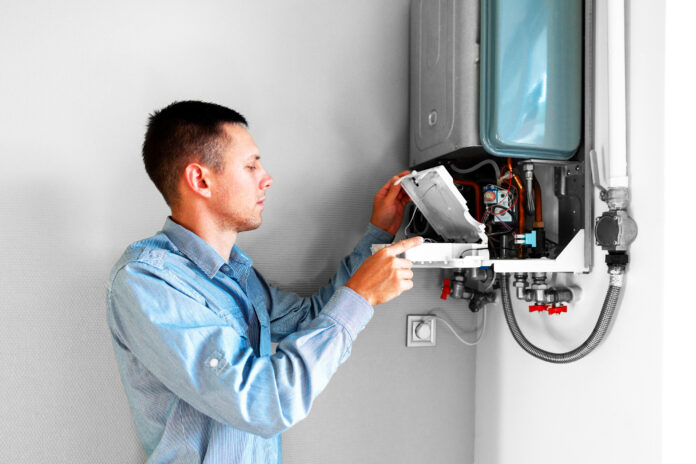Installing a water heater in your home can be an intimidating task for any homeowner. It’s important to understand the basics of how water heaters work and what you need to do in order to make sure it’s installed correctly. This post will provide an overview of what you should consider before installing a new water heater.
Types of Water Heaters
When considering which type of water heater is best for your home, there are three main types that you should consider: electric, gas, and tankless. Electric water heaters are the most common and least expensive option, but they have a lower energy efficiency rating than gas or tankless models. Gas water heaters are more efficient and cheaper to operate than electric models, but they require more maintenance and higher installation costs due to the need for venting. Tankless water heaters offer the highest level of efficiency and don’t take up much space, but they also come with the highest initial cost.
Size Matters
Once you have decided on the type of water heater you want to install, you will need to determine its size. If your family uses a lot of hot water or if you live in a cold climate where temperatures drop below freezing during winter months, then you may want to consider getting a larger model with higher capacity. It’s also important to keep in mind that larger models usually cost more than smaller ones because they require more energy and materials for installation.
Energy Efficiency Is Key
When it comes to saving money on utility bills and reducing your carbon footprint, energy efficiency is key with any appliance—including your water heater! Look for units that are Energy Star certified; these models are designed with energy-saving features that help reduce electricity costs over time. Also, look out for units that offer temperature control settings so you can customize them according to your needs. This way, you won’t be wasting energy heating up too much hot water when not needed!
Safety Precautions
Before beginning any installation process, it is important to ensure that all safety precautions are taken into consideration. Properly shut off power or gas sources prior to starting any installation process and make sure all electrical connections have been safely tested prior to use. You should also check local codes and regulations prior to installing any type of water heater, as some areas may require specific permits or licensing requirements in order for installations to be legal. It is also important to keep flammable materials away from the area where installation is taking place, as this could create an unsafe environment when dealing with heating elements or gas lines.
Installation Process
Once safety precautions have been considered, it is time to begin the actual installation process with help from professional plumbers if needed. It is important that all connections are properly sealed and properly sized depending on existing piping systems in your home as well as any additions necessary for the proper operation of your new system (such as additional valves). Once everything has been installed correctly, pressure tests must be done in order to ensure that no leaks will occur once the system has been filled with water. It is also important that you familiarize yourself with start-up procedures so that your new system can run without any issues once it is ready for use.
Installing a new water heater can be an intimidating task for many homeowners; however, understanding what type of system works best for your home, along with taking necessary safety precautions, can make this process much smoother and easier overall. Make sure you do your research ahead of time so that you know exactly what type of heater you need, as well as what needs to be done during the hot water heater installation process itself in order for things to go smoothly. With these tips in mind, you can rest assured knowing that your new system will be running smoothly in no time!















